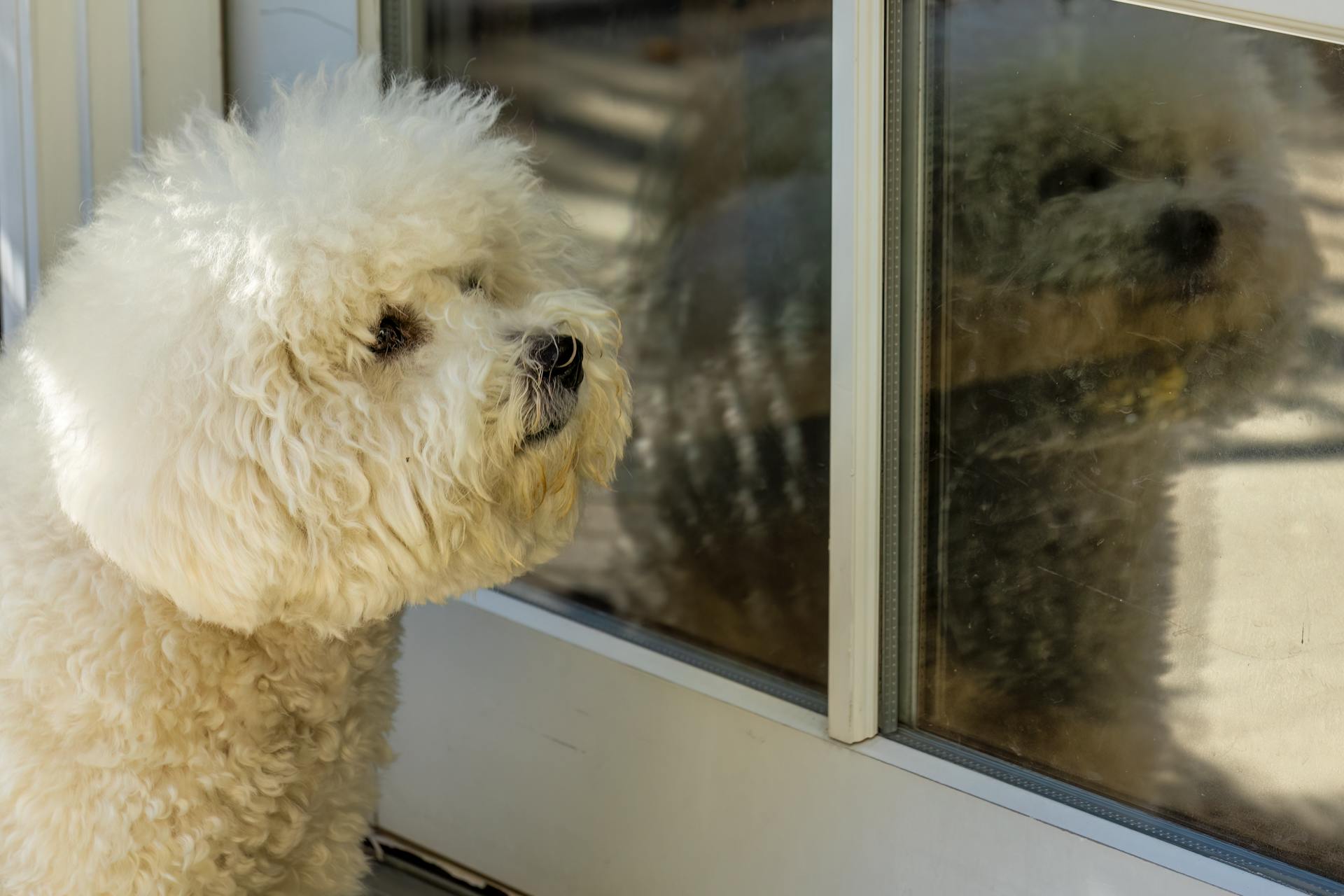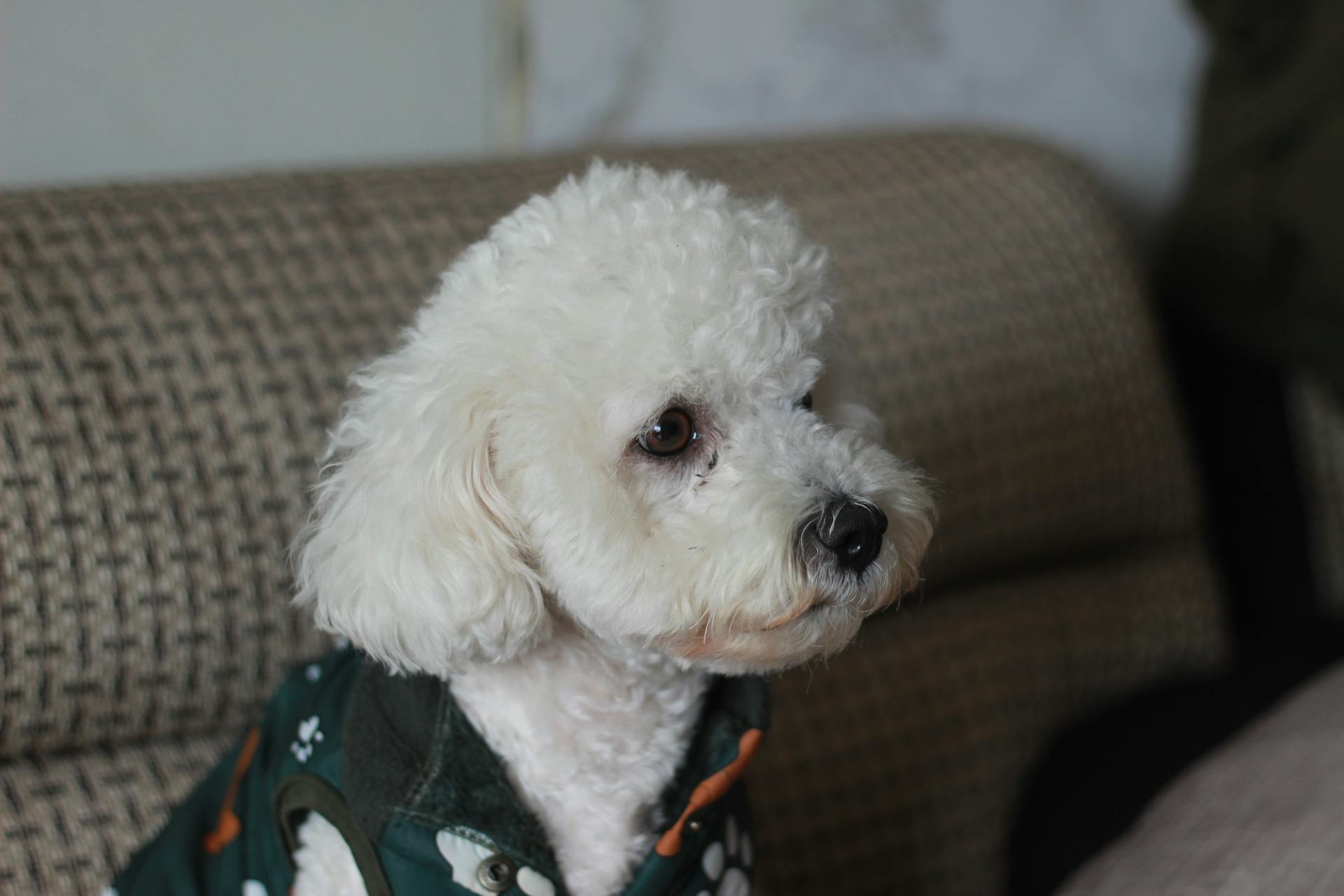
Bichon Frise skin problems can be a real challenge for owners. One of the main causes is allergies, which can be triggered by food or environmental factors.
Allergies can lead to skin conditions like atopic dermatitis, a common issue in Bichon Frises. This condition causes intense itching and inflammation.
Bichon Frises are also prone to skin fold dermatitis, a condition that affects the skin in their facial folds. This can be prevented with regular cleaning and drying of these areas.
Regular grooming can help prevent skin problems in Bichon Frises, but it's not a guarantee against skin fold dermatitis.
Check this out: American Bully Food Allergies
Skin Problems in Bichon Frises
Bichon Frises are prone to skin problems due to their sensitive nature and genetic predisposition. They require a regular routine and can become stressed and unhappy if left alone.
Stress-related skin and coat problems are common in Bichon Frises, causing dull, dry coats, dry, flaking skin, and various coat and skin disorders. A dull, dry coat is a sign of stress in Bichon Frises.
Sebaceous cysts are common in Bichon Frises and can develop around hair follicles. If your Bichon Frise scratches or bites at the cyst, a secondary infection could occur.
Bichon Frises can also suffer from follicular tumours, which are tiny tumours that develop around hair follicles. These tumours can be benign, but it's essential to get your vet to check them out, as they can be malignant.
Excessive scratching, licking, and biting of the skin are common signs of allergies in Bichon Frises, along with redness, rashes, or sores on the skin.
You might enjoy: Bichon Frise Curly Hair
Sebaceous Cysts
Sebaceous cysts are common in Bichon Frises, and they can be easily mistaken for ingrown hairs. They develop around the sebaceous glands near hair follicles.
These cysts contain sebum, an oily material created by the sebaceous glands. It's not uncommon for Bichon Frises to scratch or bite at the cyst, which can lead to a secondary infection.
Your veterinarian must surgically remove sebaceous cysts, and they will prescribe antibiotics for any related infections. Don't try to squeeze or pick at the cyst yourself, as this can be painful and lead to infection.
A fresh viewpoint: Difference between Kennel Cough and Upper Respiratory Infection
Sebaceous cysts won't generally go away on their own and can be irritating and potentially painful for your dog. They develop when the sebum clogs up the skin around hair follicles, causing congestion and cyst development.
It's essential to talk to your vet about how to proceed with treating sebaceous cysts, rather than trying to treat them at home. Squeezing or picking at the cysts can be painful and lead to infection, so it's best to leave it to the professionals.
Canine Symptoms
If you suspect your Bichon Frise has a skin problem, look out for flaky scales, lesions, and excessive scratching - classic symptoms of skin infections. These can be signs of pyoderma, a skin condition that affects dogs.
Itching and scratching are common signs of allergies in Bichon Frises, including excessive licking and biting of the skin, redness, rashes, or sores on the skin. You may also notice redness, rashes, or sores on their skin.
Take a look at this: Pitbull Dog Signs
Allergies can manifest as gastrointestinal problems, such as vomiting, diarrhea, or an upset stomach. If your Bichon Frise frequently sneezes, coughs, or exhibits difficulty breathing, it may be a sign of an environmental allergy.
Dogs with surface pyoderma may experience mild but itchy hot spots or skin fold infections known as intertrigo. These infections haven't penetrated the skin deeply, making them the most easily treatable type of pyoderma.
Superficial pyoderma is the most common type of pyoderma in dogs, extending to the hair follicles and the outermost layer of skin. It can cause red or pus-filled bumps, scabs, or circular lesions with a crust or rim of flaky skin.
A physical exam, detailed patient history, and cytology test are key elements in diagnosing pyoderma and its underlying cause. Your vet may also ask about your dog's itching, appetite, and overall health to determine the underlying cause of the skin problem.
Expand your knowledge: Bacterial Pyoderma Hypothyroidism in Dogs Skin Problems
Hair and Skin Issues
Hair loss in bichon frises can be a common issue, especially at the site of vaccinations, which is a condition known as injection site alopecia.
This condition can become apparent between three and six months post-vaccination, and in some cases, hair loss can occur on other parts of the body, including the legs, face, and tail tip.
Your veterinarian can biopsy the affected area to diagnose the condition and prescribe medication that may reverse the alopecia.
Regular grooming is essential for bichons, and they should be bathed at least monthly to keep their coat soft and white.
A good-quality dog shampoo and conditioner can help prevent drying out the skin and coat, but excessive bathing should be avoided.
Intriguing read: Sudden Hearing Loss in Dog
Pilomatricomas
Pilomatricomas are hair follicle tumors that can appear on your bichon's trunk.
They're relatively common in aging bichons and can be benign or malignant.
These small tumors may be mistaken for trichoepitheliomas, which are almost always benign.
However, pilomatricomas have a gritty texture due to mineralization of their contents.
Your veterinarian will surgically remove the tumor and test it for cancer with a biopsy.
Malignancy is relatively rare, but it's essential to have a biopsy to confirm the diagnosis.
Once one pilomatricoma develops, others will usually follow.
Hair Loss
Hair loss can be a common issue in bichon frises, especially at the site of vaccinations.
This condition is known as injection site alopecia, and it doesn't occur immediately after the inoculation, but rather as much as 10 months later.
Hair loss usually becomes apparent between three and six months post-vaccination.
Some dogs may start losing hair on other parts of the body, including the legs, face, and tail tip.
Thickening of the skin and lesions may also occur.
Your veterinarian can diagnose the condition and prescribe medication that may reverse the alopecia by biopsying the affected area.
Seborrhea
Seborrhea is a skin condition characterized by flaky, itchy patches on the scalp, face, and other oily areas of the body.
It's often mistaken for dandruff, but seborrhea can affect more areas and be more severe.
The condition is caused by an overproduction of sebum, an oily substance produced by the skin's sebaceous glands.
This excess oil can lead to inflammation and irritation, making the skin red and itchy.
Seborrhea can be triggered by stress, hormonal changes, and certain medical conditions.
In severe cases, seborrhea can cause hair loss, especially if the condition is left untreated.
Treatment options include medicated shampoos, creams, and oral medications that help reduce inflammation and slow down oil production.
By following a consistent skincare routine and using gentle products, you can help manage seborrhea symptoms and prevent flare-ups.
Ear and Skin Care
Bichon Frises need regular ear care to prevent infections. A monthly ear cleaning is essential, and you can do it at home using an over-the-counter ear cleanser.
Excessive ear hair can lead to ear infections, so keep an eye out for signs like scratching, smelly ears, or pain. If you notice any of these symptoms, take your Bichon to the veterinarian for an examination.
Bathing your Bichon at least once a month is also crucial for skin care. A good-quality dog shampoo and conditioner will help keep their coat soft and white, but be careful not to overdo it, as excessive bathing can dry out their skin and coat.
See what others are reading: Preventative Care Keeping Your Pet Healthy Year-Round
Ear Care
Bichon Frises need regular ear cleaning to stay healthy. This should be done once a month, either by a groomer or at home using an over-the-counter ear cleanser.
Excessive ear hair can lead to ear infections in Bichons, so keep an eye out for signs like excessive scratching or smelly ears.
If your Bichon is experiencing ear problems, take them to the vet for an examination.
Skin Care
Bichons need regular baths to keep their coat soft and white. Bath them at least once a month using a good-quality dog shampoo and conditioner.
Excessive bathing can dry out their skin and coat, so it's essential to strike a balance.
A monthly bath will help maintain their skin and coat health, preventing problems like dryness and irritation.
Sources
- https://www.cuteness.com/article/bichon-frise-skin-problems
- https://www.pets4homes.co.uk/pet-advice/common-skin-and-coat-problems-in-the-bichon-frise-dog-breed.html
- https://www.akc.org/expert-advice/health/pyoderma-in-dogs/
- https://www.petmd.com/dog/breeds/bichon-frise
- https://tinylittlepawsvet.medium.com/understanding-bichon-frise-allergies-and-sensitivities-tips-for-allergy-prone-owners-faf31e977ba4
Featured Images: pexels.com


